The Blue Devils have already dealt with adversity once this year, following a disheartening loss to then-No. 2 Kentucky. They responded by winning the 2K Classic in New York and then ripping off four straight victories of 19 points or more.
Now, Duke has another obstacle to overcome—and will have to do so without Amile Jefferson.
After news broke Monday evening that the Blue Devils’ senior captain would be sidelined indefinitely with a right foot injury, No. 7 Duke returns to Cameron Indoor Stadium Tuesday for a 7 p.m. matchup with Georgia Southern. Through the first nine games, Jefferson is averaging a double-double with 11.4 points and 10.3 rebounds per game and leads the team with a .683 field goal percentage, in addition to assuming his usual role as the team’s defensive linchpin and vocal leader on the floor.
“It really changes with the loss of Amile. Again, we don’t know how long this is going to be, but it changes a lot because our team changes a lot,” Duke associate head coach Jeff Capel said during his radio show Monday. “One of the big points of emphasis without Amile is going to be rebounding because Amile was one of the best rebounders in the country, especially offensive rebounding. That gave us extra shots—whether that was a [3-pointer], him making a shot, getting us to the foul line, getting us in the bonus. We’re really going to have to do a big-time job of rebounding.”
In his first three seasons in Durham, Jefferson became known for his offensive rebounding prowess and his knack for snatching up missed shots and converting them into easy buckets. This year, he has taken that skill to another level, grabbing 4.8 offensive boards per contest, a mark that ranks fifth in the nation.
The Philadelphia native has already posted five double-doubles this season, but the rest of the Duke team has collected just two double-digit rebounding games—one apiece from graduate student Marshall Plumlee and sophomore Grayson Allen. Allen notched his first career double-double with 22 points and 11 rebounds against Buffalo his last time out, and more performances like that will go a long way in helping Duke (8-1) surviving without Jefferson in the immediate future.
“Grayson has an opportunity to step up more in that role,” Capel said. “But we have an opportunity for everyone to step up, and we need everyone to step up and do their job at a very high level.”
Without another true power forward on the roster, Jefferson’s absence will likely slide 6-foot-9 freshman Brandon Ingram to the power forward slot and push rookie point guard Derryck Thornton into the starting lineup. Ingram has thrived in more of a guard’s role recently—scoring 47 points in his last two games—but the Blue Devils will need him to use his height and reach inside to give them some presence inside, even as they feature more three-guard sets on the floor.
Duke will likely turn to another freshman, 6-foot-10 Chase Jeter, to team with Plumlee in the paint to mitigate the loss of Jefferson's interior presence. Jeter was tabbed as a five-star recruit and the No. 11 overall player in the Class of 2015, but has yet to translate his talent into results on the floor—the Las Vegas native is averaging 8.1 minutes and 2.7 points per game and has logged more than five minutes just once in Duke's last six games.
Head coach Mike Krzyzewski has utilized Jeter less against smaller teams—the freshman did not play at all against guard-oriented Indiana in the Big Ten/ACC Challenge—but the Eagles (3-4) play three young forwards who stand 6-foot-8, meaning Jeter could see plenty of minutes Tuesday.
Although Jeter has not had an impact performance yet, Plumlee says he is encouraged by the rookie's progress, and that he is far ahead of where he was himself as a freshman.
“I see guys like Luke [Kennard] and Chase, guys who want to do so well that you can overdo it, in a lot of ways. So their hearts are in the right place. It’s just about getting their heads in the right place,” Plumlee said. “I have the utmost faith in them. I think they’re figuring it out quicker than I ever figured it out. Just having confidence in their ability—they’re talented, they’re here for a reason.”
Although the Blue Devils rely heavily on contributions from inexperienced players like Ingram, Georgia Southern is even greener in that department. Eleven of the Eagles’ 12 scholarship players are in their first or second years with the program, and their top two scorers—Tookie Brown and Ike Smith, who combine for 27.0 points per game—are both freshmen.
Duke’s lack of frontcourt depth will present an interesting dilemma for Georgia Southern, which loves to fire away from downtown. The Eagles have attempted 45.3 percent of their total field goals from beyond the arc, and those 3-point shots account for 37.3 percent of their total scoring of 85.0 points per game.
Although Georgia Southern only connects on 35.6 of those 3-point attempts, Capel pointed to the Eagles’ two games against Auburn and Mississippi—in which they chucked up 18 combined treys on 65 attempts—and noted that, should those threes start falling, the Blue Devils could be in trouble.
“They look to heat it up, and every time you have a team that shoots a lot of threes, you have a shooter’s chance,” Capel said. “If you’re contesting them and they’re missing, there are going to be long rebounds. We have to be ready to rebound the ball. That’s going to be one of our biggest challenges going forward. Guys have to step up because we lost our best rebounder.”
Get The Chronicle straight to your inbox
Signup for our weekly newsletter. Cancel at any time.

